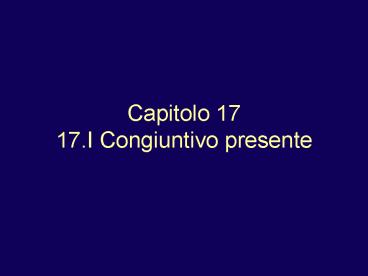Capitolo 17 17.I Congiuntivo presente - PowerPoint PPT Presentation
1 / 17
Title:
Capitolo 17 17.I Congiuntivo presente
Description:
Title: Capitolo 17 17.I Congiuntivo presente Author: dharya Last modified by: dharya Created Date: 7/15/2002 2:20:03 PM Document presentation format – PowerPoint PPT presentation
Number of Views:191
Avg rating:3.0/5.0
Title: Capitolo 17 17.I Congiuntivo presente
1
Capitolo 1717.I Congiuntivo presente
2
Congiuntivo presente
- 1. Penso che i bambini oggi guardino troppo la
televisione. - 2. Noi dubitiamo che quel famoso chitarrista
suoni dal vivo al concerto. - 3. Voglio che tu non fischi i cantanti durante
l'opera. - 4. Speriamo che che la folla non gridi quando il
tenore sale sul palcoscenico.
3
Congiuntivo presente
- Mood 1. Indicative (what IS) present, past
perfect (passato prossimo), imperfect,
pluperfect, future, future perfect, passato
remoto, trapassato remoto. 2. Imperative (what
is ordered to someone). 3. Conditional (what
could be or could have been) present, past. 4.
Subjunctive (what is possible, desirable,
doubtful, or an opinion) present, past,
imperfect, pluperfect).
4
Congiuntivo presente
- Formation remove -are, -ere, -ire of
infinitive and add endings. Note the
characteristic i vowel of are verbs and a of ere
and ire verbs. Verbs in -ire use -isc in all
persons except noi and voi. Since the singular
has one ending for three persons, the subject
pronoun is frequently used. Endings for noi and
voi are similar for all three conjugations. Verbs
in -care, -gare, -ciare, and -giare have the
usual spelling changes.
5
Congiuntivo presente
- Vuole che io suoni bene.
- Vuole che tu suoni bene.
- Vuole che lei suoni bene.
- Vuole che noi suoniamo bene.
- Vuole che voi suoniate bene.
- Vuole che loro suonino bene.
6
Congiuntivo presente
- Vuole che io parli piano.
- Vuole che io mangi troppo.
7
Congiuntivo presente
- Pensa che io legga il libro.
- Pensa che tu legga il libro.
- Pensa che lui legga il libro.
- Pensa che noi leggiamo il libro.
- Pensa che voi leggiate il libro.
- Pensa che loro leggano il libro.
8
Congiuntivo presente
- Pensa che io scriva male.
- Pensa che io prenda il dolce.
9
Congiuntivo presente
- E possibile che io offra il dolce.
- E possibile che tu offra il dolce.
- E possibile che lei offra il dolce.
- E possibile che noi offriamo il dolce.
- E possibile che voi offriate il dolce.
- E possibile che loro offrano il dolce.
10
Congiuntivo presente
- E possibile che io dorma presto.
- E possibile che io capisca tutto.
11
Congiuntivo presente
12
USE The subjunctive mood expresses doubt,
conjecture, opinion, desire, emotion. A verb in
the subjunctive is normally used in a subordinate
clause introduced by che. The subject of the
main and subordinate clause must be different, or
the infinitive is used (at times preceded by the
preposition di)
13
Congiuntivo presente
- 1. Spero che il signor Torcicollo parta domani.
- 2. Spero di partire domani.
- 3. Voglio che tu finisca tutta la bistecca.
- 4. Voglio finire tutta la bistecca.
14
Congiuntivo presente
- 1. Verbs that express will or desire
desiderare, insistere, preferire, sperare, volere - Insisto che la vecchia zia Zapatilla non lavori
in cucina oggi. - Congiuntivo presente
15
Congiuntivo presente
- 2. emozione avere paura, sono contento/a,
felice, triste, ecc., temere - I genitori temono che il piccolo Querk fumi nel
bagno.
16
Congiuntivo presente
- 3. dubbio dubitare, non credere, non essere
sicuro/a - Non credo che Schniltz arrivi domani.
17
Congiuntivo presente
- 4. opinione credere, immaginare, pensare
- 5. e qualsiasi aggettivo o avverbio (ma non
chiaro, certo, ovvio, sicuro, vero) - 6. any verb or expression that expresses
subjectivity (what you feel, like, perceive) mi
piace, mi sembra, sembra, bisogna































